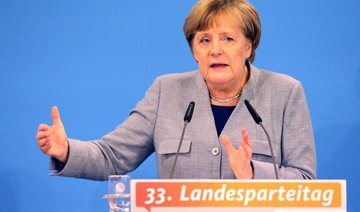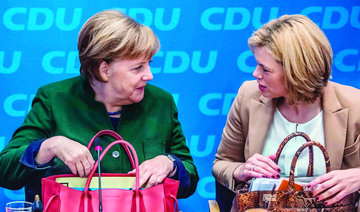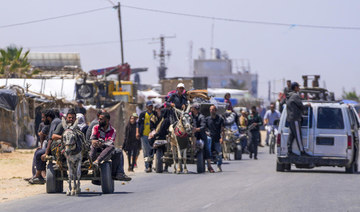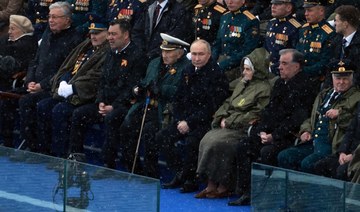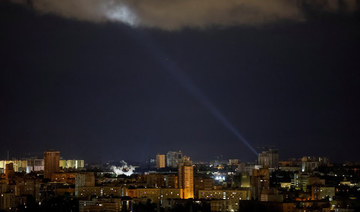BERLIN: Chancellor Angela Merkel said Germany’s top parties still had “big obstacles” to surmount before reaching a new coalition deal, ahead of a last-ditch round of negotiations Thursday.
The veteran leader, who is battling to form a new government to salvage her political future, warned it would be a “tough day” of talks, which were expected to stretch well into the night.
She said her conservative Christian Democrats would “work constructively to find the necessary compromises but we are also aware that we need to execute the right policies for our country.”
September’s inconclusive elections left Merkel without a majority and struggling to find partners to govern Europe’s biggest economy.
After her earlier attempt at forging a coalition with two smaller parties collapsed, she is now pinning her hopes on renewing an alliance with the Social Democrats (SPD).
SPD leader Martin Schulz also spoke of “big obstacles” as he arrived for the final day of preliminary talks on whether there is enough common ground to move on to formal coalition negotiations.
He said his party wanted to ensure that the new government committed “above all to working toward renewal of the European Union.”
However, he sounded a more upbeat note than Merkel, saying there was “broad agreement on the fundamentals of European policy.”
The chancellor badly needs the talks to succeed, as do Schulz and the leader of her Bavarian allies, Horst Seehofer, said political analyst Karl-Rudolf Korte of Duisburg-Essen University.
“The negotiations are not just about a coalition, but also their careers. It would be the end for all three if this coalition does not come about,” he told public broadcaster ZDF.
Late on Thursday the parties are due to declare if they will push on with efforts to forge a new government by around March or April.
Along the way, negotiators need to compromise on policy differences — the SPD is seeking welfare gains while the conservatives are pushing for tax cuts as Germany’s public coffers bulge.
As the clock ticks into a fourth month of political paralysis in Germany, Berlin’s biggest EU partner France waded in, with its Finance Minister Bruno Le Maire on Wednesday echoing the SPD’s demand for greater investments from Berlin.
Beyond fiscal and spending issues, the parties are struggling to fend off the encroaching far-right, which has seized on anger over the influx of refugees and netted a record showing at the polls in September.
To halt a haemorrhage to the far-right, Merkel’s alliance wants a tougher stance on immigration, something that is hard to sell to the center-left SPD.
Even if negotiators find a deal, it can still be torpedoed when SPD delegates and later rank-and-file members get to vote on whether the traditional labor party should once again govern in Merkel’s shadow.
SPD vice chairman Ralf Stegner underlined the great uncertainty about a possible deal, tweeting that “skepticism was, is and remains justified.”
The SPD’s youth wing chief Kevin Kuehnert is also energetically running a resistance campaign against any agreement with the conservatives.
“I am very optimistic for the party congress: we can still stop the grand coalition,” Kuehnert told Spiegel weekly.
The SPD’s youth movement leader believes that governing for another four years under Merkel would deal a death blow to the Social Democrats, who were slapped with a historic low score in September’s elections.
Instead, Kuehnert favors the option of a minority government led by Merkel, even though her conservatives have rejected that option as too unstable.
Latest opinion polls suggest that a potential new grand coalition enjoys little favor with Germans.
A survey published by Focus magazine found that 34 percent of Germans prefer new elections, while only 30 percent favored a return of the conservative-SPD alliance.
Another poll published by public broadcaster ARD found that only 45 percent of Germans view a new grand coalition positively, while 52 percent considered it a bad option.
And a third survey, for business paper Handelsblatt, showed that a majority — 56 percent — believed Merkel would not see out her four-year term.
Merkel warns of ‘big obstacles’ in final push for new govt
Merkel warns of ‘big obstacles’ in final push for new govt
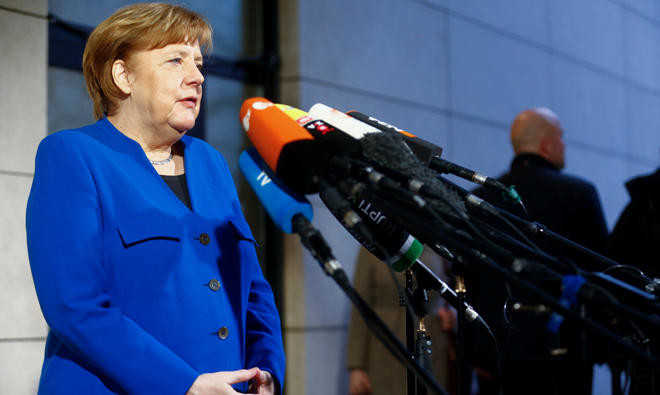
India says Canada has shared no evidence of its involvement in killing of Sikh separatist leader
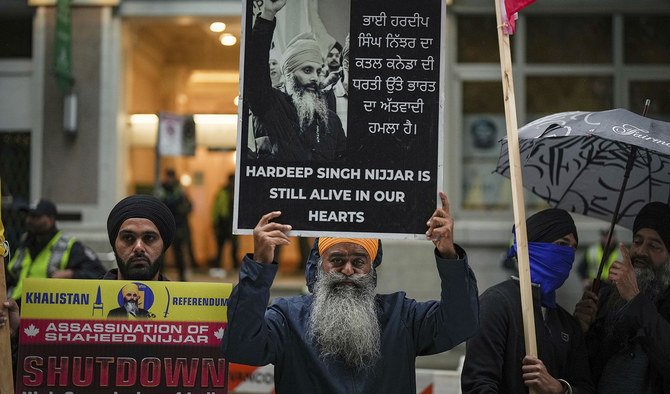
- Three Indian nationals who had been temporarily living in Canada were arrested on Tuesday in the June slaying of Hardeep Singh Nijjar
- PM Trudeau set off a diplomatic spat with India in Sept. when he cited ‘credible allegations’ of India’s involvement in the Sikh’s murder
NEW DELHI: India said Thursday that Canada has shared no evidence to back its allegation that the Indian government was involved in the slaying of a Sikh separatist leader in Canada last year, despite the recent arrests of three Indian men in the crime.
India’s External Affairs Ministry spokesman Randhir Jaiswal also reiterated India’s longstanding allegation that Canada harbors Indian extremists.
Three Indian nationals who had been living in Canada temporarily were arrested on Tuesday in the slaying last June of Hardeep Singh Nijjar in British Columbia. Canadian Prime Minister Justin Trudeau had set off a diplomatic spat with India last September when he cited “credible allegations” of India’s involvement in the slaying of the Sikh separatist. India rejected the accusations.
Canadian Mounted Police Superintendent Mandeep Mooker said after the men’s arrests that the investigation into whether they had ties to India’s government was ongoing.
Jaiswal said the two governments are discussing the case but that Canada has forwarded no specific evidence of the Indian government’s involvement.
Meanwhile, Jaiswal said New Delhi has complained to Canadian authorities that separatists, extremists and those advocating violence against India have been allowed entry and residency in Canada. “Many of our extradition requests are pending,” he said.
“Our diplomats have been threatened with impunity and obstructed in their performance of duties,” Jaiswal added. “We are having discussions at the diplomatic level on all these matters,” he said.
The three Indian men arrested in Canada haven’t yet sought any access to the Indian diplomats there, Jaiswal said.
The three — Kamalpreet Singh, 22, Karan Brar, 22, and Karanpreet Singh, 28 — appeared in court Tuesday via a video link and agreed to a trial in English. They were ordered to appear in British Columbia Provincial Court again on May 21.
They were arrested last week in Edmonton, Alberta. They have been charged with first-degree murder and conspiracy to commit murder.
Spain, Ireland to recognize Palestinian state on May 21 — EU’s Borrell
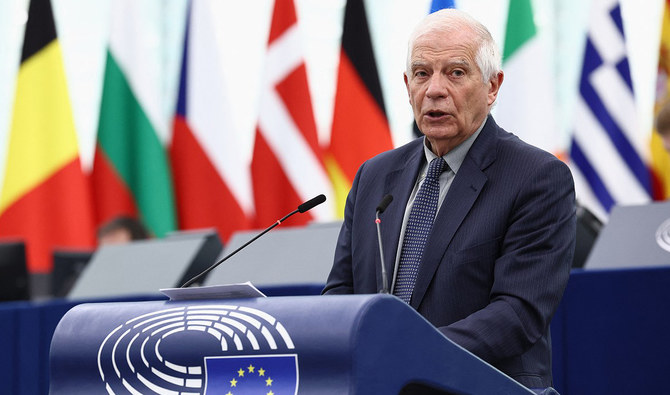
- Calls for end to Palestinian-Israeli conflict have grown along with the death toll from Israel’s war on Gaza
- Spain, others agreed to recognition of Palestinian state, seeing a two-state solution as essential for peace
MADRID: Spain, Ireland and other European Union member countries plan to recognize a Palestinian state on May 21, the EU’s foreign policy chief, Josep Borrell, said late on Thursday ahead of an expected UN vote on Friday on a Palestinian bid to become a full member.
Spanish Prime Minister Pedro Sanchez said in March that Spain and Ireland, along with Slovenia and Malta, had agreed to take the first steps toward recognition of a Palestinian state alongside Israel, seeing a two-state solution as essential for lasting peace.
Asked on local Spanish radio station RNE if May 21 was when Spain, Ireland and other EU countries would recognize a Palestinian state, Borrell said yes, mentioning Slovenia as well.
“This is a symbolic act of a political nature. More than a state, it recognizes the will for that state to exist,” he said, adding that Belgium and other countries would probably follow.
Previously, Spanish Foreign Minister Jose Manuel Albares had said the decision on recognition had been made, although he did not give a date.
International calls for a ceasefire and permanent end to Palestinian-Israeli conflict have grown along with the death toll from Israel’s offensive in Gaza to rout out Hamas after the militants’ deadly cross-border attack on Oct. 7.
Israel has said plans for Palestinian recognition constitute a “prize for terrorism” that would reduce the chances of a negotiated resolution to the Gaza conflict.
On Friday the United Nations General Assembly is set to back a Palestinian bid to become a full UN member by recognizing it as qualified to join and sending the application back to the UN Security Council to “reconsider the matter favorably.”
Ireland’s national broadcaster RTE said on Thursday that Spain, Ireland, Slovenia and Malta had been waiting for the UN vote and were considering a joint recognition on May 21.
A spokesperson for the Spanish Foreign Ministry did not immediately respond to a request for comment. There was no immediate comment on the date from the other countries.
Slovenian Prime Minister Robert Golob said earlier this week his country would recognize Palestine’s statehood by mid June.
Since 1988, 139 out of 193 UN member states have recognized Palestinian statehood.
Spain, Ireland to recognize Palestinian state on May 21 — EU’s Borrell

- Calls for end to Palestinian-Israeli conflict have grown along with the death toll from Israel’s war on Gaza
- Spain, others agreed to recognition of Palestinian state, seeing a two-state solution as essential for peace
MADRID: Spain, Ireland and other European Union member countries plan to recognize a Palestinian state on May 21, the EU’s foreign policy chief, Josep Borrell, said late on Thursday ahead of an expected UN vote on Friday on a Palestinian bid to become a full member.
Spanish Prime Minister Pedro Sanchez said in March that Spain and Ireland, along with Slovenia and Malta, had agreed to take the first steps toward recognition of a Palestinian state alongside Israel, seeing a two-state solution as essential for lasting peace.
Asked on local Spanish radio station RNE if May 21 was when Spain, Ireland and other EU countries would recognize a Palestinian state, Borrell said yes, mentioning Slovenia as well.
“This is a symbolic act of a political nature. More than a state, it recognizes the will for that state to exist,” he said, adding that Belgium and other countries would probably follow.
Previously, Spanish Foreign Minister Jose Manuel Albares had said the decision on recognition had been made, although he did not give a date.
International calls for a ceasefire and permanent end to Palestinian-Israeli conflict have grown along with the death toll from Israel’s offensive in Gaza to rout out Hamas after the militants’ deadly cross-border attack on Oct. 7.
Israel has said plans for Palestinian recognition constitute a “prize for terrorism” that would reduce the chances of a negotiated resolution to the Gaza conflict.
On Friday the United Nations General Assembly is set to back a Palestinian bid to become a full UN member by recognizing it as qualified to join and sending the application back to the UN Security Council to “reconsider the matter favorably.”
Ireland’s national broadcaster RTE said on Thursday that Spain, Ireland, Slovenia and Malta had been waiting for the UN vote and were considering a joint recognition on May 21.
A spokesperson for the Spanish Foreign Ministry did not immediately respond to a request for comment. There was no immediate comment on the date from the other countries.
Slovenian Prime Minister Robert Golob said earlier this week his country would recognize Palestine’s statehood by mid June.
Since 1988, 139 out of 193 UN member states have recognized Palestinian statehood.
Spain, Ireland to recognize Palestinian state on May 21 — EU’s Borrell
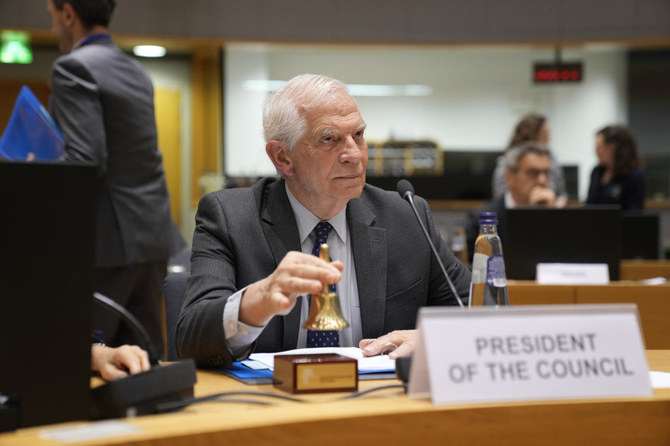
- Spain and Ireland, along with Slovenia and Malta, had agreed to take the first steps toward recognition of a Palestinian state alongside Israel
MADRID: Spain, Ireland and other European Union member countries plan to recognize a Palestinian state on May 21, the EU’s foreign policy chief, Josep Borrell, said late on Thursday ahead of an expected UN vote on Friday on a Palestinian bid to become a full member.
Spanish Prime Minister Pedro Sanchez said in March that Spain and Ireland, along with Slovenia and Malta, had agreed to take the first steps toward recognition of a Palestinian state alongside Israel, seeing a two-state solution as essential for lasting peace.
Asked on local Spanish radio station RNE if May 21 was when Spain, Ireland and other EU countries would recognize a Palestinian state, Borrell said yes, mentioning Slovenia as well.
“This is a symbolic act of a political nature. More than a state, it recognizes the will for that state to exist,” he said, adding that Belgium and other countries would probably follow.
Previously, Spanish Foreign Minister Jose Manuel Albares had said the decision on recognition had been made, although he did not give a date.
International calls for a ceasefire and permanent end to Palestinian-Israeli conflict have grown along with the death toll from Israel’s offensive in Gaza to rout out Hamas after the militants’ deadly cross-border attack on Oct. 7.
Israel has said plans for Palestinian recognition constitute a “prize for terrorism” that would reduce the chances of a negotiated resolution to the Gaza conflict.
On Friday the United Nations General Assembly is set to back a Palestinian bid to become a full UN member by recognizing it as qualified to join and sending the application back to the UN Security Council to “reconsider the matter favorably.”
Ireland’s national broadcaster RTE said on Thursday that Spain, Ireland, Slovenia and Malta had been waiting for the UN vote and were considering a joint recognition on May 21.
A spokesperson for the Spanish Foreign Ministry did not immediately respond to a request for comment. There was no immediate comment on the date from the other countries.
Slovenian Prime Minister Robert Golob said earlier this week his country would recognize Palestine’s statehood by mid June.
Since 1988, 139 out of 193 UN member states have recognized Palestinian statehood.
Putin reappoints Mishustin as Russia’s prime minister
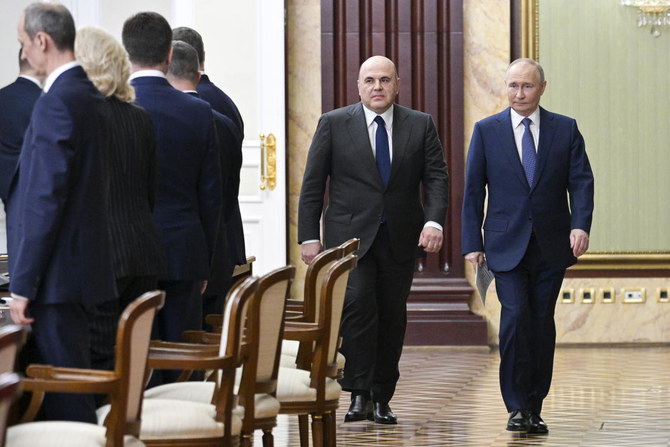
- Parliament Speaker Vyacheslav Volodin said the house, the State Duma, will hold a session later Friday to consider Mikhail Mishustin’s candidacy
MOSCOW: Russian President Vladimir Putin has reappointed Mikhail Mishustin as prime minister for the lower house’s approval.
Parliament Speaker Vyacheslav Volodin said the house, the State Duma, will hold a session later Friday to consider Mishustin’s candidacy.
Mishustin’s approval is a mere proforma in the Kremlin-controlled parliament.
In line with Russian law, Mishustin, 58, who held the job for the past four years, submitted his Cabinet’s resignation on Tuesday when Putin began his fifth presidential term at a glittering Kremlin inauguration.
Mishustin’s reappointment was widely expected by political observers, who noted that Putin values his skills and the lack of political ambition. Mishustin, the former head of Russia’s tax service, has kept a low profile, steering clear of political statements and avoiding media interviews.


